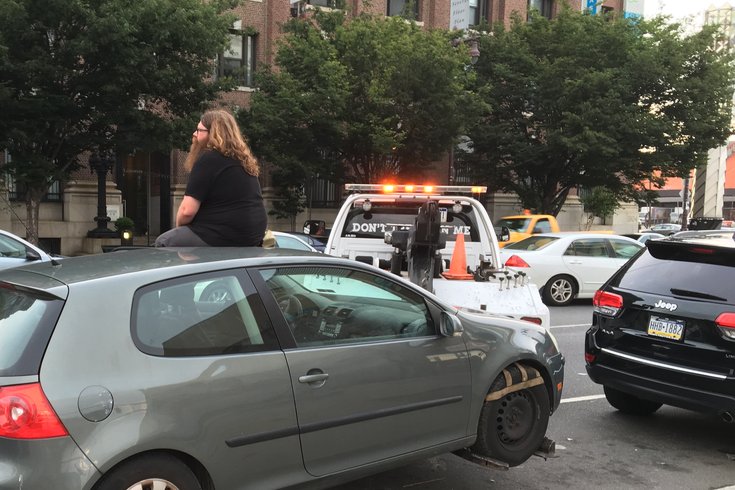
October 06, 2016
 Adam Malliet/For PhillyVoice
Adam Malliet/For PhillyVoice
This photo shows Adam Malliet sitting atop his car in protest as a tow-truck operator attempts to haul it from a space on South Broad Street in July.
Tow operators, beware.
The city's L&I department is working quickly to regulate an industry rife with reports of shady practices through an online, searchable database of parking locations monitored by towing companies and the hiring of a management company to keep tow operators in line.
The department is stepping in even though city code entrusts the Philadelphia Parking Authority, by arrangement with the city, to take responsibility for ensuring that tow operators operate on the up-and-up, according to L&I spokeswoman Karen Guss.
Guss said that city officials had indeed expected PPA to enter into an agreement under Chapter 9, Section 605 of the code, which notes that the PPA "will administer and enforce all provisions of this [s]ection..."
"The idea was that the parking authority was going to take over the whole package," Guss said. "That has not come to pass and it isn't in the works now... L&I needs to step up and implement what's in the code."
On Thursday, the department met to begin nailing down just how the online database would work.
"This is something we can do now and we are working on doing it," she said.
The idea of an online database is already part of a package of three towing-related bills introduced by City Councilwoman Maria Quiñones-Sanchez (D-7th District) that are set to be discussed by the Committee on Streets and Services.
The city was reminded of the need for such a database this past summer, when several drivers in South Philadelphia claimed they were victims of a "bait-and-trap" towing scheme. Several drivers said they parked in legal spaces on South Broad Street, near Alter Street, only to find their cars towed after a no parking sign suddenly appeared where their vehicles had been parked.
Over the years, however, that hasn't happened. Now, L&I has decided to step in, she said.
Though L&I has no timeline for rolling out the online database, it is currently under development, she said. Thursday's meeting focused on how to implement the database.
"This has to be a modern process," said Guss. "The idea is that you'll be able to look them up."
The database is just one way the department intends to reign in problem towing companies, she said.
A request for proposals is being prepared to hire a towing management company that would be charged with ensuring tow companies are operating legally and enforcing city towing regulations. The RFP should be ready by year's end.
Other cities have hired similar companies, and Philadelphia would benefit from having a third party acting as a watchdog over an industry that doesn't exactly lend itself to enforcement by the police or L&I, Guss said.
Most problems with towing companies occur in the evenings when L&I has fewer employees available to deal with them, she said.
"We don't have the manpower for that," she said. "We just aren't set up for it."
City police already have enough to do without having to respond every time a car is towed. In fact, officers once were required to respond when a vehicles was towed. But in 2013, that requirement was rescinded and tow operators were permitted to verify their tows were legitimate by photographing the vehicle and the infraction.
The towing management company would be tasked with looking into complaints from drivers who have been involved in car crashes, she said.
Guss said that when a tow truck driver shows up to clear an accident scene, too often the drivers involved in the crash are encouraged to sign tow-related paperwork with "very bad terms." Many drivers, stressed and unprepared to read all the terms, sign anyway and end up agreeing to unfavorable fees and terms.
"Thats a big problem we see at accidents," she said.
Until a towing management company can start its work in Philadelphia, the situation will be handled by a task force comprising L&I, police and the city's Managing Director's Office.
"They are looking at what we can do in the meantime," she said.